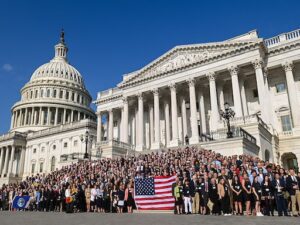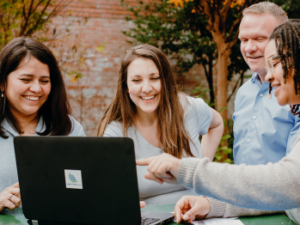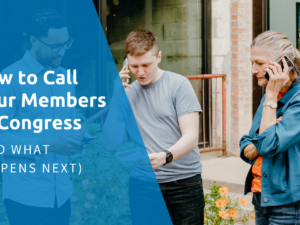
Audubon is keenly aware of climate change’s threats. For example, Audubon projects that without aggressive climate action, the common loon will have no breeding habitat in Minnesota by the end of the century.
CCL and Audubon collaborate for climate action
By Jamie McCoy, with Matt Tucker
My interest in birds started with a family eco-tour of Costa Rica in 2010. During that trip, our guides were constantly eyeing the forest canopy for birds—in the Monteverde Cloud Forest, we were lucky enough to see several resplendent quetzals. I was awakened to the wild places right overhead, and I thought, “We have a canopy in Iowa. I’m sure there are interesting birds there too.” On arriving back in Iowa, I got a pair of old Bushnell binoculars out of the closet, walked into the woods near our house, looked up, and saw a flock of cedar waxwings. I was hooked!

Resplendent quetzal (photo taken by the author)
But climate change is having disastrous effects on birds. The Audubon Society published an impressive and ominous study titled “Survival by Degrees,” which covers the effects of climate change on bird habitat ranges and their ability to survive. Two-thirds of North American birds they studied are threatened with extinction due to climate change.
As a birder and a Citizens’ Climate Lobby volunteer, I wanted to connect with my birding community in Iowa to build more support for climate solutions we—and our birds—desperately need.
Finding other politically active birders
I joined the Iowa Ornithologists’ Union several years ago, and began receiving quarterly journals and using their resources to find birds. I made it to my first spring meeting in May 2018, which consisted of a full weekend of birding with local experts, lectures, and social time with about 100 other birders.
During that meeting, I gave a 10-minute presentation about CCL’s carbon pricing proposal, known as carbon fee and dividend. It was well received, and I passed out contact information for attendees to connect to Citizens’ Climate Lobby. Later, I contacted the leadership of the Iowa Ornithologists’ Union about a possible endorsement, and learned the birding organization in the state that engages in political activity is Iowa Audubon.
Whereas the Ornithologists’ Union has an educational and scientific purpose, Audubon goes a step further into advocacy. They are well aware of how climate change is harming birds. To respond to this threat, Audubon activates its grassroots members across the political spectrum to work toward a clean energy future. This makes them a natural ally to CCL. We too value bipartisanship, grassroots advocacy, and are pushing for major climate action from our elected officials.
In the fall of 2018, at another Iowa Ornithologists’ Union meeting, I met Doug Harr, the COO of Iowa Audubon. After introducing myself and the idea of carbon fee and dividend, I found he was very receptive. Even with Audubon’s clear emphasis on climate change at the national level, this interaction confirmed that personal relationships and common interests are helpful when working to build local support.
I sent Doug more information on CCL’s policy proposal, which he volunteered to share with the Iowa Audubon board. The board is made up of representatives from each Iowa Audubon chapter. Within a month, the board had voted to sign an endorsement letter for carbon fee and dividend. It felt great to realize that the very friendly Audubon members genuinely want to help.
Support for national legislation
By the spring of 2019, the idea of carbon fee and dividend had been introduced into Congress as the Energy Innovation and Carbon Dividend Act (H.R. 763). This ambitious national legislation will reduce carbon emissions at least 40% in the first 12 years, and 90% by 2050. (That exceeds Audubon’s own goal of contributing to 80% emissions reduction by 2050.)
We had already planned to make a presentation to the board when they met in Eastern Iowa, so we updated our presentation to include an “ask” for their endorsement of this bill. In our presentation, we focused on the fact that the Energy Innovation Act is an effective means of combating climate change, which overlaps with Audubon’s goal to fight climate change due to its harmful effects on birds. After the presentation, they voted on the spot to endorse the bill.
Let’s see more collaboration
Of Audubon’s 450+ nationwide chapters, 15 of them have endorsed the Energy Innovation Act. And they’re not alone—this policy has garnered over 1,000 endorsements from an array of other nonprofits, businesses, and outdoors groups.
We hope to see even more collaboration like this between CCL chapters and Audubon chapters nationwide. In the words of E.B. White, “I arise in the morning torn between a desire to save the world and a desire to savor it. This makes it hard to plan the day.” All our members, whether in CCL or the Audubon Society, could benefit from taking a break from saving the world and get out into nature. CCL volunteers might consider reaching out to your local Aububon chapter and going on an early morning birding expedition, or even inviting a member of Congress along. There are birding events all year around, with every month bringing the excitement of new species coming through.
In addition to those local activities, CCLers can also support Audubon’s national legislative work on climate change, as well as the relationship that already exists between CCL’s legislative team and Audubon’s staff. Remember those supporting asks CCL volunteers made at our lobbying meetings in D.C.? One of those is the BEST Act, which Audubon is backing. Your collaboration with Audubon chapters on a local level will continue to build great relationships between our organizations, all in service of our ultimate goal: preserving a stable climate for all the living things we love.
Are you an Audubon member or birder? Do you enjoy a birdfeeder in your yard? Consider reaching out to your local Audubon chapter and setting up a meeting to discuss how our two organizations can collaborate. For help getting started, feel free to contact me at .





